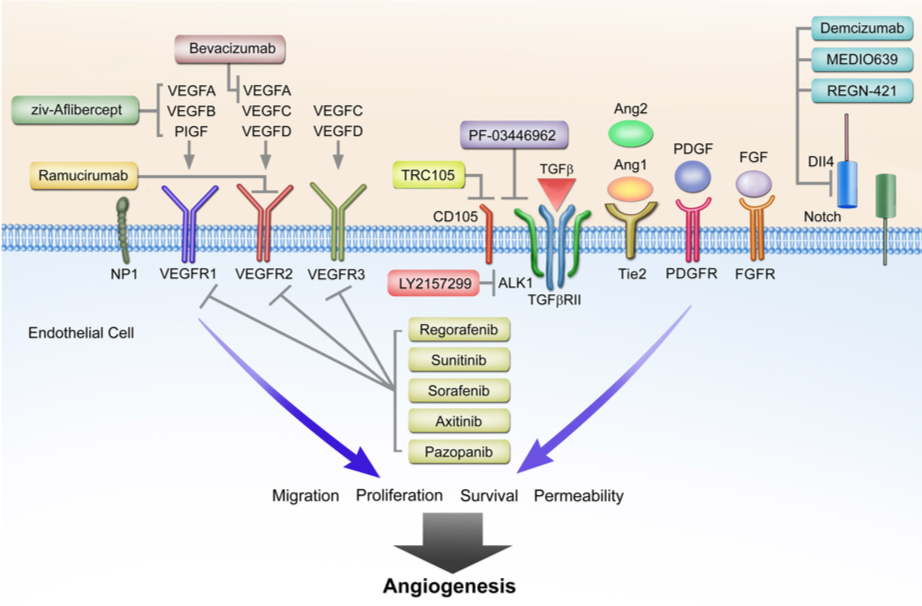Overview of angiogenesis
Angiogenesis, the formation of new blood vessels, is a critical requirement for the progression of solid tumors. Anti-angiogenic drugs have been shown to slow disease progression, extend survival, and provide clinical benefit in a number of disease settings. The vascular endothelial growth factor (VEGF) pathway is the fundamental player in angiogenesis, and has been the focus of study in this field. The first FDA approved anti-angiogenic drug is bevacizumab, a monoclonal antibody that blocks VEGF signaling. Multiple anti-angiogenic drugs have been approved or in various stages of clinical trials, reviewed by Dr. Hurwitz, our former supervisor. http://jgo.amegroups.com/article/view/1282/pdf
Angiome
Our laboratory has pioneered the analysis of blood-based inflammatory and angiogenesis factors and is the only credentialed Molecular Reference Laboratory for blood-based analyses across the US cancer cooperative group system. We have conducted biomarker analyses across multiple phase III studies and analyzed dozens of Phase I and Phase II studies conducted by the National Cancer Institute’s early and late stage clinical trials networks (ET-CTN and NCTN). In 2017, we were approved by the NCI Biomarker Review Committee to incorporate our Angiome panel as an integratedbiomarker in more than 14 ongoing trials, including the NRG studies, GY-004 and GY-005, evaluating the combination of cedarinib and olaparib in ovarian cancer.
Over the years and as our experience accumulated, this panel has been continuously optimized to include the most scientifically-rational markers, based on our own experience, the literature, and collaborations with other academic and pharma partners. Additionally, over time we learned which assays performed well and which assays underperformed. Keeping to best science, only high-quality assays that provided reproducible data were included as the panel developed. Lastly, many of the assays in our multiplex arrays were developed specifically for our use to interrogate angiogenesis, extracellular matrix remodeling, inflammation, and vascular activation.
In 2017, our Angiome panel of 20 biomarkers was NCI approved, covering various aspects of angiogenesis, inflammation, and tumor biology.
Our contribution to the field of anti-angiogenic therapeutics
Over the past 15 years, using angiome as a consistant tool to test anti-angiogenic drugs, we analyzed dosens of phase I-III clinical trials, tested thousands of patients across multiple disease types. Listed below are some representative reviews summarizing our discoveries.
- The search for biomarkers to direct immune therapy in ovarian cancer
- Clin Cancer Res. 2020, 26(16): 4268-4279
- The search for biomarkers to direct antiangiogenic treatment in epithelial ovarian cancer.
- Clin Cancer Res. 2020, 26(6): 1288-1296
- Gynecol Onco. 2014, 135(2): 349-358
- Bevacizumab biosimilars: scientific justification for extrapolation of indications.
- Metastatic clear cell renal carcinoma: circulating biomarkers to guide antiangiogenic and immune therapies.
- The Oncologist. 2019. 24: 202-210
- Urol Onco. 2016, 34(11):510-518
- Identifying blood-based protein biomarkers for antiangiogenic agents in the clinic: a decade of progress.
- Targeted inhibition of VEGF receptor 2: an update on ramucirumab.


